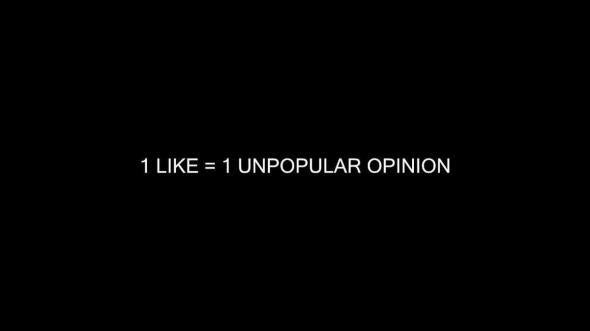Memes sweep through Twitter like ocean currents. Sometimes they help us vent collective frustrations in deeply personal ways, and on other occasions they become opportunities for self-referential cleverness. Though even the best memes grow old fast, this willingness to be goofy together makes the platform worth returning to.
One of the network’s latest memes, however, shows off the social network at its most exhaustingly annoying. The posts almost all start the same. A user tweets an image with white characters that say, “1 like = 1 unpopular opinion,” on a field of black. Though the graphic speaks for itself, a short message typically accompanies it. “Okay, let’s do this,” wrote Jeet Heer, one of the progenitors of the Twitter essay format. “Ok. I’ll give this a try,” offered Vox’s Matthew Yglesias.
Replying to their original tweet, these users proceed to offer a steady, numbered stream of abbreviated takes. “Short stories > novels,” read one of Heer’s contributions. “Dogs are bad,” Yglesias proposed. While those are debatable proclamations, in other cases, users stake out positions that approach something like a widespread consensus, as Yglesias did when he challenged the supposed delusions of Californians:
Many of these positions feel less like truly unpopular opinions than they do like curmudgeonly complaints. More often than not, they will only be truly “unpopular” within specific milieus. Criticizing the West Coast’s fast food, for example is sure to resonate affirmatively with Shake Shack and Five Guys–loving Northeasterners. (I, for the record have no opinion on In-and-Out Burger. Please don’t @ me.) Similarly, even those who live in San Francisco might agree that the city could improve its public sanitation.
The lists themselves, meanwhile, primarily serve to index a user’s social capital, showing both that others care what they think and that they think about a lot of things. Among those who reared themselves in the early-21st-century blogosphere, participating in this exercise isn’t so much a confession as it is a ritualistic act of self-affirmation. Indeed, for internet personalities like Yglesias (who used to work at Slate), nothing could be more on brand than a rejection of received wisdom. As the journalist Mark Harris joked, tweeting your unpopular opinions may not be all that different from just … tweeting.
In the broadest sense, the “1 like = 1 opinion” format is familiar and not entirely unwelcome. One variant, for example, found Twitter users suggesting books in response to likes. That approach yielded a cornucopia of compelling options, especially from the minds of enthusiastic readers like Slate contributor Isaac Butler. The mode works in large part because it plays off the infrastructure of Twitter itself, requiring a modicum of interaction from those on the sidelines: What could be simpler than clicking the mysterious heart button? Simultaneously, it demands almost virtuosic displays of knowledge and thoughtfulness from the site’s most popular contributors—displays that many are more than prepared to offer.
The “unpopular opinion” version of the meme, however, threatens to lay bare the underlying laziness of the convention. At its best, Twitter can open up unlikely pathways of communication between otherwise distinct individuals and communities. Tweet at a celebrity and sometimes the celebrity will tweet back. Enter into an argument with a stranger and sometimes (rarely, but sometimes!) you’ll make a new friend.
By contrast, unpopular opinions are designed to be just that. They are often little more than showy humblebrags: To assert one (or 100) is to suggest that you stand out from the crowd, whether or not you truly do. The long lists assembled by personalities such as Yglesias and Heer threaten to devolve into performances of reflexive contrarianism. Freed of context, they discourage argument, evidencing little more than the pique of those who espouse them. In aggregate the meme’s popularity demonstrates only that the oppositional stance many attribute to Slate itself has colonized the internet as a whole.
There are, of course, ways to use the unpopular opinion meme well. Prior to its current surge, the writer Beth McColl effectively parodied it avant la lettre composing a thread in 2016 that included such gems as “crime is fine when i do it” and “let the donut crop replenish before eating more . otherwise more global warming will happen.” More recently, other Twitter users have offered some positions that are engagingly provocative.
The best of these provocations, however, frequently feel more like quick pitches than simple opinions. Whether or not you’re inclined to agree with them, you’ll likely find yourself hoping the writer would expand upon them. In some other cases, the opinions in a thread do build on one another, suggesting openings for more complex assertions. Heer included a pair of tweets about anti-racism and decolonization in Canada that reflect themes that he has explored before, even as they suggest the rough outlines of a promising argument. But tossing them into a list that also includes the claim “Superhero movies and comics should be made for kids,” potentially trivializes them, giving the impression that these thoughts are less worthwhile than they have the potential to be.
And that’s the rub of it. If an opinion is worth expressing, it’s worth letting it breathe on its own. I, for my own part, tried to do just that, tweeting my own distaste for the meme on Monday night and hoping to leave things there. To my dismay, Jack Hamilton, Slate’s pop critic, liked my brief note in order to make me “go again.” I responded with the opinion that Jack is a cool guy. Please fave if u agree.
